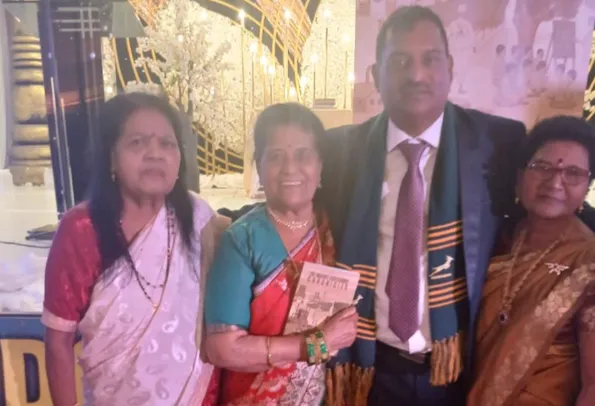“Bommiammas” - the mothers of the Mount Edgecombe soil
Voices from the canefields

Ambi Jhona, left, Vijay Pather, author Selvan Naicker and Vasantha Pather
Image: SUPPLIED
HISTORICAL researcher Selvan 'Patchie' Naicker has captured 165 years of Indian indentured labourers' history in his new book The Mount Edgecombe Chronicles - echos of the canefields. Focusing particularly on the untold stories of women who sustained communities and preserved cultural traditions, the book transforms oral histories into written record for future generations
The book was launched on Sunday at the Mount Edgecombe Arts and Cultural Centre amid laughter and tears as Naicker read excerpts including the tales of “The Chilingling Pechachi (the Ringing Devil) and The Hunt for the Mavundo (wild boar.
Naicker said the book contained stories of them growing up in Mt Edgecombe and the many untold stories of women in the community who had sustained communities and preserved cultural traditions.
“In 2010 when we had the 150-year celebration of the arrival of Indians to South Africa and at the time had looked for information on Mount Edgecombe and there was not much.
“Yet, I recalled as a young boy being surrounded by these stories. So, I went back and began talking to the people in the community, and the rich history, these amazing stories began to flow,” said Naicker.
“The history that has been captured focuses a lot on the women and their experiences. The women were the ones who carried the community while the men went out into the sugar fields and worked. They took care of the children and the elderly. They also carried the traditions and culture of our people. They were also the ‘doctors’ who used home remedies to cure the sick. They were also the teachers who ensured the children were educated. I believe their voices and stories is a true reflection of our history,” he added.
The “Bommiammas” - Mothers of the Mount Edgecombe Soil is a chapter in the book which reflects this.
Naicker described “Bommiamma” as a “matriarch whose quiet strength and cultural memory shaped generations.”
He traced the story of Thangam Naidoo, to the Madras Presidency. She arrived in Natal in 1902 as a 16-year-old bride, carrying a brass pot and a bundle of dried neem leaves.
Her husband, a cane cutter twice her age, died within five years.
“Bommiamma” never remarried. She became a healer, midwife, memory-keeper, and a quiet revolutionary.
He said the barracks did not recorded her name but the soil did.
“Bommiamma’s hands were calloused from decades of labour cutting cane, tending gardens, nursing fevers, and coaxing babies into the world with chants and turmeric. She knew which leaves cured malaria, which oils eased childbirth, which stories could stitch a broken heart. Her remedies were not written in books; they were passed from palm to palm, whispered between women, folded into banana leaves…
“When the barracks manager tried to ban temple gatherings, Bommiamma led a silent
procession barefoot, sari soaked in rain, holding a brass lamp. No slogans. No shouting.
Just presence. The ban was lifted within a week.”
Bommiamma died in 1969. Her funeral drew hundreds.
Naicker said the quote: “You can walk the world, but if you don’t know your roots, you don’t know your upbringing,” set the tone for his book.
“The younger generation today need to know that their successes, their triumphs in life, lies on this poor Indian, the sugar cane-cutter. And in the book, we praise the cane-cutter, male, and female, because they had the foresight and vision. They had the intelligence to build a brighter life for us,” said Naicker.